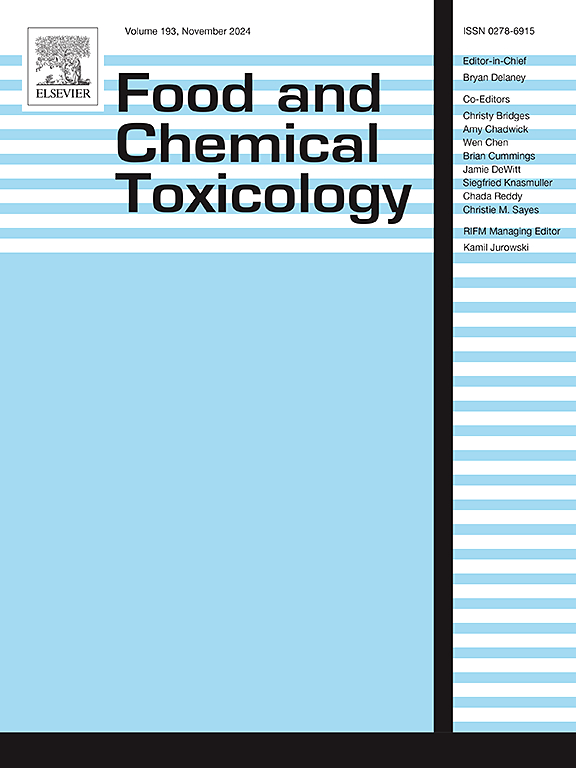Effect of oral Mn-based nanozymes Mn3O4 NPs on morphological, antioxidation, mucosa, and fecal microbial community in mice colons
IF 3.9
3区 医学
Q2 FOOD SCIENCE & TECHNOLOGY
引用次数: 0
Abstract
Mn3O4 NPs, manganese-based nanoparticles with multienzyme-like antioxidative activity, have been widely used in anti-inflammatory, anti-tumor, and other related studies, especially those related to Inflammatory Bowel Disease (IBD). However, before formalizing these studies, it is important to assess their oral safety (especially intestinal) to understand its potential adverse effects on biological systems and intestinal health. In this study, we synthesized Mn3O4 NP which has been reported to have proven multienzyme-like antioxidative activity based on previous studies. The fixed-dose method was used to evaluate the oral acute toxicity of Mn3O4 NPs in mice, followed by 14 days of observation. Then, relative parameters were explored for mice undergoing continuous gavage of 125 mg/kg and 250 mg/kg BW Mn3O4 NPs for 20 days. The continuous oral administration of low-dose Mn3O4 NPs for 20 days resulted in an increased expression of mRNA of antioxidant genes in mice colon. These changes led to an improvement in the antioxidant capacity of the colon. In contrast, the administration of a high dose of Mn3O4 NPs resulted in colonic oxidative damage, and mucosal damage in mice colons, as well as an increase in the ratio of Firmicutes to Bacteroidota of the fecal microbial communities.
求助全文
约1分钟内获得全文
求助全文
来源期刊

Food and Chemical Toxicology
工程技术-毒理学
CiteScore
10.90
自引率
4.70%
发文量
651
审稿时长
31 days
期刊介绍:
Food and Chemical Toxicology (FCT), an internationally renowned journal, that publishes original research articles and reviews on toxic effects, in animals and humans, of natural or synthetic chemicals occurring in the human environment with particular emphasis on food, drugs, and chemicals, including agricultural and industrial safety, and consumer product safety. Areas such as safety evaluation of novel foods and ingredients, biotechnologically-derived products, and nanomaterials are included in the scope of the journal. FCT also encourages submission of papers on inter-relationships between nutrition and toxicology and on in vitro techniques, particularly those fostering the 3 Rs.
The principal aim of the journal is to publish high impact, scholarly work and to serve as a multidisciplinary forum for research in toxicology. Papers submitted will be judged on the basis of scientific originality and contribution to the field, quality and subject matter. Studies should address at least one of the following:
-Adverse physiological/biochemical, or pathological changes induced by specific defined substances
-New techniques for assessing potential toxicity, including molecular biology
-Mechanisms underlying toxic phenomena
-Toxicological examinations of specific chemicals or consumer products, both those showing adverse effects and those demonstrating safety, that meet current standards of scientific acceptability.
Authors must clearly and briefly identify what novel toxic effect (s) or toxic mechanism (s) of the chemical are being reported and what their significance is in the abstract. Furthermore, sufficient doses should be included in order to provide information on NOAEL/LOAEL values.
 求助内容:
求助内容: 应助结果提醒方式:
应助结果提醒方式:


